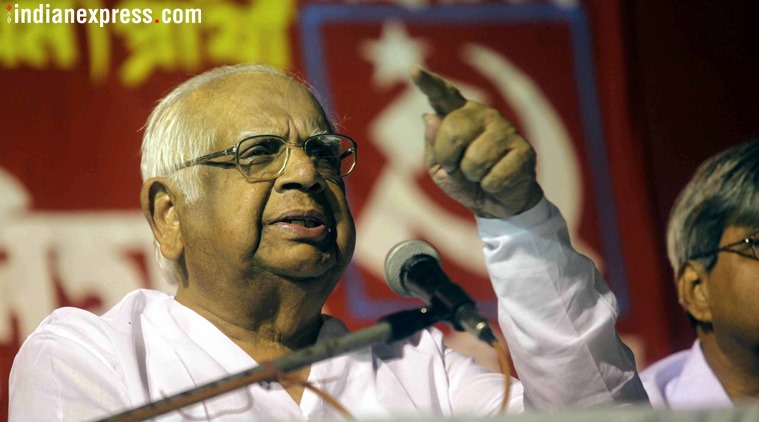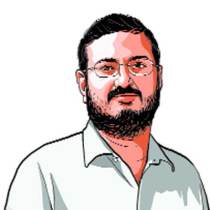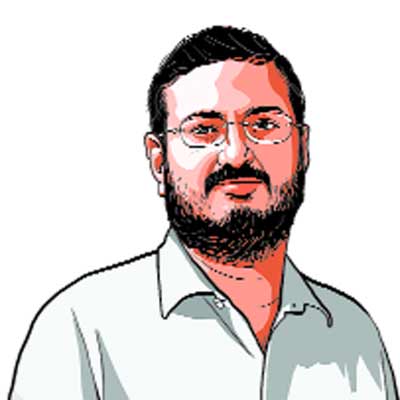A Speaker for the people
Somnath Chatterjee’s stewardship of the 14th Lok Sabha will serve as a benchmark, to guide leaders of all institutions

His tenure was replete with people-centric parliamentary innovations. (Express photo by Shubham Dutta)
If a member of a legislature happens to be a quintessential constitutionalist endowed with sagacity, a liberal worldview, humanism and an unflinching commitment to justice, liberty, equality and fraternity, the House of which she/he is a member is bound to benefit. And if such a member gets to steer the functioning of the House, it is certain to reach great heights of glory. This is exactly what had happened to the 14th Lok Sabha, when one of India’s brightest and most outstanding parliamentarians, Somnath Chatterjee, held the office of its Speaker.
His tenure was replete with people-centric parliamentary innovations. He wanted to extend the visitors’ gallery of Parliament to every household in the country. Beginning with the live telecast of the “zero hour” proceedings, he personally monitored the evolution of the Lok Sabha television channel, the world’s first 24×7 TV channel to be owned and operated by Parliament. Its purpose is simple yet significant: Inform people of the goings-on in Parliament on a real time basis. Opening up the rich Parliament Library to researchers and media persons, creating a new museum and children’s corner in the Parliament Library building, setting-up parliamentary fora on diverse subjects and the introduction of a lecture series to equip the members with knowledge on emerging trends, the institution of parliamentary research fellowships and the Hiren Mukherjee Memorial Lecture were some of the many initiatives under Chatterjee’s leadership.
But what was most dear to Chatterjee was the principle of accountability and the constitutionally-guaranteed supremacy of the legislature in its own sphere. He never minced words when he perceived any deficiency on these counts. Sample an excerpt from his crisp letter addressed to the then prime minister in February 2006: “While the House is in session, I believe, it is not in consonance with the dignity and the position of the House, that the ministers… should go out of station without prior information to the Presiding Officer and without informing the office of the Speaker of any alternative arrangement. As such, may I request you to please impress upon your colleagues the importance of following what should be the norm.” His directions for the compulsory presentation of action taken on Standing Committee reports, the admission of probably the highest number of calling attention notices, his insistence on short discussions and adjournment motions — tools crafted for the benefit of the Opposition — and enhancing the number of Standing Committees for improved oversight stand testimony to his zeal.
Parliamentary diplomacy is another innovation that took shape under Chatterjee’s leadership. Visits by Indian parliamentary delegations abroad in alignment with the foreign policy orientation of the country were an improvement from the past. This also resulted in India scoring a major victory — its election to the position of Chairman of the Executive Committee of Commonwealth Parliamentary Association. Chatterjee’s refusal to visit countries that did not extend the “no-frisking” courtesy on a reciprocal basis was an assertion that India is in no way inferior to these countries.
His tenure was also marked by two conferences of presiding officers, which ended up passing resolutions urging the judiciary to honour the Laxman rekha. The media loved to project his emphasis on well-laid out constitutional principles as confrontations. But the reality was something else. He held the judiciary in the highest esteem. Though he questioned the constitutional validity of judicial orders regarding the conduct of the floor test in the hung Jharkhand legislature, his advice to the people who mattered was to honour the order of the Supreme Court. He was clear that unless it was set aside by another judicial order, the verdict should be implemented. He emphasised the dignity of all institutions, including the judiciary.
Another highlight of his illustrious tenure as Speaker is the disposal of a record number of Tenth Schedule (anti-defection) matters in the shortest possible time, in a fair and judicious manner. Not one of his many quasi-judicial pronouncements was ever challenged. The orders passed by him, each dictated by him personally, have set benchmarks in the adjudication of anti-defection matters, and shall form reliable authority for all time to come. The events and achievements, the changes that were witnessed and the debates generated during his stewardship of the 14th Lok Sabha shall guide leaders in all our institutions.
After I was interviewed by Chatterjee in June 2004 for a position in his personal staff, I came back with the satisfaction of having had the best five minutes of my life. My father, when informed about my being chosen to be a member of his team, was apprehensive about my ability to last long because of my village upbringing and my education in a Telugu-medium institution. These, he felt, would prove inadequate to meet the exacting standards of a towering leader. He was right. I fell terribly short on many occasions. Yet, Somnath Chatterjee’s affection and indulgence allowed me to bask in reflected glory for five years. Salaam sir.
The writer served as OSD to Somnath Chatterjee when he was Lok Sabha Speaker (2004-09)
For all the latest Opinion News, download Indian Express App
More From Prasanna Kumar Suryadevara
- Open HouseLegislatures should allow the media and public at committee proceedings...
- Neither Office, Nor ProfitPrevious judicial pronouncements suggest AAP MLAs may be on a safe wicket..
- On test in UttarakhandClarity is needed on the supremacy of legislature, and its limits, in its own sphere...








































No hay comentarios:
Publicar un comentario